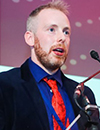Co-Located Conference AgendasFlow Chemistry European Summit 2023 | The Space Summit Europe 2023 | 

Monday, 27 March 202308:00 | Conference Registration, Morning Coffee and Tea | |
Session Title: Conference Opening Session |
| | 09:00 |  | Conference Chair Welcome and Introduction by Conference Co-Chair
Jana Stoudemire, Director, In-Space Manufacturing, Axiom Space, United States of America
|
| 09:30 |  | Conference Chair Welcome and Introduction by Conference Chairperson
Marc Giulianotti, Sr. Manager, In Space Biomanufacturing, Sierra Space, United States of America
|
| 10:00 |  | Keynote Presentation Bioprinting of Mammalian and Non-Mammalian Cells for Applications in Space Exploration
Michael Gelinsky, Professor and Head, Center for Translational Bone, Joint and Soft Tissue Research, Faculty of Medicine, Technische Universität Dresden, Germany
Bioprinting has developed tremendously over the last 10-15 years. While the technology at the beginning has been investigated only for biomedical applications, utilizing human or other mammalian cells, in the meanwhile also non-mammalian cells like green algae, cyanobacteria or plant-derived cells have been bioprinted successfully. This opens new opportunities for applications in biotechnology. Both is also of interest for space flight: for long-term space exploratory missions and extra-terrestrial human settlements, e. g. on Moon or Mars, the astronauts must be able to treat health problems on site as a fast return to Earth is impossible. 3D bioprinting is a promising technology which might allow fabrication of tissue constructs like skin and bone with limited equipment and materials which mostly could be produced locally. Bioprinted constructs containing algae might be utilized for oxygen production and wastewater treatment. The presentation will give an overview about the work of the lab which has pioneered bioprinting of non-mammalian cells (“green bioprinting”) and which is closely connected to the European Space Agency ESA and the German Space Agency at DLR concerning the investigation of bioprinting for applications in space.
|
| 10:30 |  ICE Cubes Space Access for Life Sciences and Flow Chemistry R&D ICE Cubes Space Access for Life Sciences and Flow Chemistry R&D
Hilde Stenuit, ICE Cubes Space Access Business Developer, ICE CUBES Space Applications Services
The International Commercial Experiments Cubes Service – in short – ICE Cubes provides access to microgravity for life sciences and flow chemistry R&D. The service offers specific assets and is building new capabilities relevant for such R&D. The presentation will give an overview of the capabilities, success stories we have flown before in those areas and which new platforms in areas as organoids, 3D bioprinting, organ-on-chip are being developed.
| 11:00 | Mid-Morning Coffee, Tea and Networking | 11:30 |  You Can Bioprint in Space Now: Redwire’s 3D Bioprinter is Ready Aboard the ISS You Can Bioprint in Space Now: Redwire’s 3D Bioprinter is Ready Aboard the ISS
Molly Mulligan, Director, Business Development, Redwire
Have you ever wondered what happens when we remove gravity from our biological processes? In low Earth orbit (LEO), 400 kilometers above our heads, is the International Space Station (ISS), an orbiting research facility that provides a proving ground for innovation and next generation technology. The ISS is open for bioprinting utilizing the unique environment of microgravity. Biological systems studied in microgravity are dominated by surface tension and diffusion rather than sedimentation and convection. In the microgravity environment on the station: cells form 3D structure without the use of a scaffolding or matrix; we can print larger 3D tissue constructs without the tissue collapsing under its own weight before strengthening; we can study the mechanisms involved in biofabrication; and much more. Learning how forces other than gravity affect the process of biofabrication can help us learn new things about our processes on Earth and allows us to find ways to minimize those forces to create new and innovative products on Earth. Redwire Corporation enables bioprinting and biofabrication in microgravity, where there are unique solutions to many problems in the laboratory and lots of room for innovation. The company has the only extrusion-based 3D bioprinter on the ISS, called the Biofabrication Facility (BFF). Redwire seeks to understand what the latest technology breakthroughs are terrestrially, so that microgravity can be used to create even more innovation in the fields of bioprinting and biofabrication. As always, the ISS is open for research from around the world, and Redwire is eager to collaborate.
| 12:00 |  | Keynote Presentation The NIH Microphysiological Systems Program: Tissue Chips for Tools for Drug Development and Precision Medicine
Danilo Tagle, Director, Office of Special Initiatives, National Center for Advancing Translational Sciences at the NIH (NCATS), United States of America
Approximately 30% of drugs have failed in human clinical trials due to adverse reactions despite promising pre-clinical studies, and another 60% fail due to lack of efficacy. A number of these failures can be attributed to poor predictability of human response from animal and 2D in vitro models currently being used in drug development. To address this challenges in drug development, the NIH Tissue Chips or Microphysiological Systems program is developing alternative innovative approaches for more predictive readouts of toxicity or efficacy of candidate drugs. Tissue chips are bioengineered 3D microfluidic platforms utilizing chip technology and human-derived cells and tissues that are intended to mimic tissue cytoarchitecture and functional units of human organs and systems. In addition toxicity studies in drug development, these microfabricated devices are also being used to model various human diseases for assessment of efficacy of candidate therapeutics. A more recent program is the development of “clinical trials on chips” to inform clinical trial design and implementation, and for studies in precision medicine. Presentation will provide a program update and future directions towards widespread use of tissue chip technologies in partnerships with various stakeholders. |
| 12:30 | Networking Luncheon in the Exhibit Hall -- Network with the Exhibitors and Engage with Colleagues | 14:00 |  The Orbital Age The Orbital Age
Marc Giulianotti, Sr. Manager, In Space Biomanufacturing, Sierra Space
| 14:30 |  Humanity’s Next Chapter Humanity’s Next Chapter
Jana Stoudemire, Director, In-Space Manufacturing, Axiom Space
| 15:00 |  Production of Superior Quality Human Organoids in Space Production of Superior Quality Human Organoids in Space
Liliana Layer, Chief Scientific Officer, Prometheus Life Technologies
The interest in human organoids for drug testing, regenerative medicine and R&D is growing, but at the same time their production on Earth is challenging and results are often inhomogeneous and not satisfactory. Here we present a new technology to harness microgravity for the facilitation of organoid formation and differentiation yielding highly reproducible and standardized results.
| 15:30 | Afternoon Coffee and Tea Break and Networking | 16:00 | Space (Heart) Ship: A Heart-on-Chip Model to Study Cardiovascular Dysfunction in Space
Kevin Tabury, Researcher, Belgian Nuclear Research Centre, Belgium
After two decades of human presence in orbit around Earth on the International Space Station (ISS), human settlement on the Moon and Mars is currently the next challenge to address in deep space exploration. Exiting the protection of our magnetosphere also lead to increase health risks from prolonged exposure to microgravity and space radiation that could seriously jeopardize space missions. Cardiovascular dysfunction and in particular accelerated cardiac aging is one of the concerns. Aging of the heart causes atherosclerosis, fibrosis, and reduced heart muscles contractility leading ultimately to heart failure. Despite our technological advances, the current molecular and cellular understanding of cardiovascular diseases because of aging is limited and mainly based on animal models. With an estimated radiation exposure of 0.5-1Sv for a manned mission to Mars, such increased cardiovascular risk becomes extremely relevant. In Space, the risks of cardiovascular diseases are also enhanced by microgravity. Thus, a deeper understanding of the biological mechanisms leading to cardiac aging is one of the key challenges in developing countermeasures. In this context, investigating the interplay between particle radiation and microgravity on cardiac aging in heart-on-chips becomes crucial. During this presentation, we will introduce our newest project and current advances in the development of a heart-on-chip model to study cardiovascular dysfunction in space. | 16:30 |  | Keynote Presentation Biomanufacturing and In-Space Production Applications on the ISS National Lab
Michael Roberts, Chief Scientific Officer, International Space Station National Laboratory, United States of America
NASA and the ISS National Laboratory are enabling the commercial development of low-Earth orbit by sponsoring both fundamental research and the in-space manufacturing of advanced materials and biological products that improve life on Earth. As the International Space Station continues to offer access to the unique benefits of a microgravity laboratory, producing breakthrough research as well as new and improved products and technologies, it is also pioneering the path forward for the transition to commercially LEO platforms. |
| 17:00 |  | Keynote Presentation Space in the UK and Why Space? The Opportunity for Health & Life Science Innovation
Philip Carvil, Head of Clusters (NW), Science and Technology Facilities Council, Part of UK Research and Innovation, United Kingdom
I’ll provide an overview of the UK position paper, Why Space the opportunity for Health and Life Science Innovation which collates inputs from researchers across the space and life science sectors as well as briefly discuss the UK Space strategy in the context of aligned cluster developments and ways to interact with the system. |
| 18:00 | Networking Reception with Dutch and Belgian Beers | 19:00 | Close of Day 1 of the Conference |
Tuesday, 28 March 202308:00 | Morning Coffee and Tea in the Exhibit Hall | |
Panel Discussion -- Title "Space Agency Perspectives" | | Session Chair: Jana Stoudemire, Director, In-Space Manufacturing, Axiom Space, United States of America |
| | 09:00 |  | Keynote Presentation Panelist -- Space Agency Perspectives
Robyn Gatens, Director of the International Space Station, NASA Headquarters, United States of America
|
| 09:00 |  | Keynote Presentation Panelist -- Space Agency Perspectives
Frank De Winne, Lead LEO Exploration Group, European Space Agency (ESA), Netherlands
|
| 10:00 | Mid-Morning Coffee, Tea and Networking in the Exhibit Hall | 10:30 | ESA’s 3D Bioprinting in Space Initiative
Christiane Hahn, Exploration Scientist - Space Biology , European Space Agency (ESA), Netherlands
Bioprinting is enabling technology for space exploration missions such as medical applications, Bioreactors & closed loop life-support systems, food production, biomining, and bioconstruction. ESA is in the process of developing a 3D Biosystem for the International Space Station, including the development of a 3D bioprinter and 3D cell culture system, as well as in-situ capabilities for incubating, maturing, stimulating, and analysing 3D bioprinted cell constructs. The objectives of ESA's 3D Bioprinting and 3D cell culture system in space is the development of biomaterials for biology research and biomaterials for clinical cases in different space mission scenarions in order to provide innovative and impactful research for science and medicine. | 11:00 | Organ-on-Chip and Organoid Technologies - Towards a Rotating Disk-based Approach for In-Orbit Research
Simon Werner, Scientist, Natural and Medical Sciences Institute (NMI) at the University of Tübingen, Germany
Tissue studies and the use of organ on chip technologies in the microgravity environment of the ISS have been shown for many years now. The research conducted has not only proven that such systems can provide valuable data and insights for medical issues in space. Moreover, disease models based on the accelerated changes of the human body in microgravity, promise valuable insights for medical research, especially here on Earth. A parallelizable, high-throughput, space-qualified technology could pave the way for a translation of fundamental results into practical pharmaceutical research on Earth and in Earth orbit. The Micro-Organo-Lab and the NMI have been developing organ-on-chip systems for a wide variety of tissue models, such as Liver, Heart, Brain, Muscle, Retina or e.g., Trans-Blood-Brain-Barriers. Recently, a rotating organ-on-disc system capable of parallel tissue establishment and perfusion by centrifugal forces was demonstrated. Since the rotation-induced g-forces are adjustable, tissue studies can be performed in Earth orbit to investigate influences of microgravity or, for example, lunar, Martian, or Earth gravity simultaneously. Therefore, we are working on further developing this as a space-proven, scalable technology platform. | 11:30 | Advanced Semiconductor-based Bioanalytical Technologies in Space
Olivier Henry, Program Director – Life Science Technologies, IMEC, Belgium
Biomanufacturing processes involve complex process flow that require to be monitored at every step. Today this is mainly done by time-consuming tests, either on-site or in a specialized off-site lab. Translating these practices into space requires the deployment of compact, miniaturized bioanalytical tools. Working towards that goal, Imec is leveraging its expertise in silicon chip technology in the development of novel instrumentation for in situ monitoring of biological processes. In this talk, we will review the application of imec technologies in biomanufacturing on earth and in space. | 12:00 | Lock-and-Play Bioreactor Platforms for Advanced Microphysiological Systems
Daniel Carvalho, Research Fellow, MERLN Institute for Technology-Inspired Regenerative Medicine, Maastricht University, Netherlands
Over the past two decades, organ-on-a-chip (OoC) devices have enabled major breakthroughs as surrogates of human tissues for a wide range of biomedical applications, from precise medicine to predicative drug screening platforms. In recent years, the incorporation of complex, 3D tissue-specific organoids into OoC devices has been shown to be synergetic and desired to create more physiologically relevant 3D in vitro models. However, the addition of such organoids has increased the complexity of already existing complex microfluidic systems. New and more versatile designs are urgently needed to facilitate chip operability, increase throughput and the success rate of complex, 3D cell cultures. Our lab has developed a new line of bioreactor platforms to facilitate the culture and screening of embryonic stem cell-derived thyroid follicles. The developed platforms integrate a reversible fastening concept entitled Lock-and-Play, which allows devices to be quickly opened and closed before, after and during operation, such that organoids can be directly accessed whenever needed. This presentation will provide an overview about these devices and future directions towards the development of next-generation OoC platforms that can find applications across the biomedical field, including for near-weightlessness and spaceflight studies. In doing so, initial studies on how the developed OoC platform can be easily modified to further include more advanced in vitro 3D models such as biofabricated ones, so that their adoption in the Biofabrication and 3D cell culture facilities that are being developed at ISS can be facilitated. | 12:30 | Do Cells in Simulated Microgravity Care about Their Cellular Microenvironment?
Mei ElGindi, Research Associate, New York University Abu Dhabi, United Arab Emirates
The effects of simulated microgravity on cells of the immune system depend on the density of their cellular microenvironment. | 13:00 | Networking Luncheon in the Exhibit Hall -- Network with the Exhibitors and View Posters |
|


 Add to Calendar ▼2023-03-27 00:00:002023-03-28 00:00:00Europe/LondonThe Space Summit Europe 2023The Space Summit Europe 2023 in Rotterdam, The NetherlandsRotterdam, The NetherlandsSELECTBIOenquiries@selectbiosciences.com
Add to Calendar ▼2023-03-27 00:00:002023-03-28 00:00:00Europe/LondonThe Space Summit Europe 2023The Space Summit Europe 2023 in Rotterdam, The NetherlandsRotterdam, The NetherlandsSELECTBIOenquiries@selectbiosciences.com